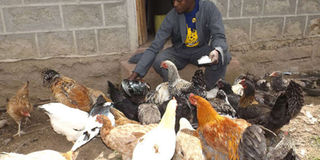Diary of a Poultry Farmer: The dos and don’ts of vaccination

Poultry farmer, Jackson Kahiga feeds his Kienyenji improved chickens at his rural home in Ol Kalou, Nyandarua. A good vaccination programme should never be a substitute for poor hygiene practices in poultry keeping on the farm. PHOTO | JOHN GITHINJI | NATION MEDIA GROUP
What you need to know:
- A good vaccination programme is not a substitute for poor hygiene practices on the farm.
- Never vaccinate sick birds.
- Skimmed milk powder should be added at a rate of 2.5g per litre of water or one teaspoon for every litre of water.
- The other way to get rid of the chlorine is by boiling the water and leaving it overnight or using a stabilising tablet sold in most agrovets at Sh50 each.
Last week when I got to my farm in Njiru, my manager had something important to tell me. “According to the schedule, we need to buy 500 doses of Gumboro vaccine tomorrow,” he said emphatically.
“We also need to buy skimmed milk.”
The part of the skimmed milk sounded surreal to me. I will get to that in a while, but before I do, let me explain why things are different this time round.
You see, I was a very worried poultry farmer last year because I couldn’t give the birds the life-saving shots. This year, things are looking up and the measures I put in place—combining farm hygiene (bio-security) with routine vaccination of the birds seem to be working.
Please, repeat after me: “A good vaccination programme is not a substitute for poor hygiene practices on the farm.”
From my records, apart from the 29 chicks I lost to the cold weather last month and the other 11 with limb paralysis, I haven’t lost more.
For sure, three weeks ago, I started administering the routine vaccines and so far, the birds have received the first and second Gumboro and the first Newcastle.
The reason I withheld the shots last year was that a good number were showing signs of illness. I had been warned against this on several occasions, “Never vaccinate sick birds.”
According to experts, vaccine failure occurs during storage, transportation and administration. The vaccines must be refrigerated during storage and transportation to the farm.
FREE FROM CHEMICALS
To transport the vaccines from town to my farm in Njiru, I use insulated cool boxes containing ice packs to maintain the temperature between two and eight degrees Celsius.

An improved indigenous kienyeji chicken vaccination programme. PHOTO | COURTESY
One thing I don’t do is to buy the vaccines a day or two before administering and keeping in my refrigerator. The danger with this is you never know when a blackout will occur.
I also make sure the vaccine doses I buy match the number of birds. Say, if you have 100 birds buy 100 doses and if you have 300 birds buy one bottle of 100 doses and one of 200 doses depending on the packages available.
In addition, I always make sure that the water I use to administer vaccines like Gumboro and Newcastle is free of any chemicals like chlorine.
Chlorine, disinfectants, detergents and metallic ions from heavy metals inactivate the vaccine. I learnt from Cleophas that skimmed milk can act as a stabiliser and that it eliminates the negative effects of chlorine.
“Skimmed milk powder should be added at a rate of 2.5g per litre of water or one teaspoon for every litre of water,” he explained. “If you are using skimmed milk, add two litres into 100 litres of water.”
The other way to get rid of the chlorine is by boiling the water and leaving it overnight or using a stabilising tablet sold in most agrovets at Sh50 each.
I also administer vitamins a day to vaccination and three days after to minimise stress in the birds. As a rule, I never mix vaccines and vitamins and in case the birds are on a course of antibiotics, you should withdraw the treatment three days prior to vaccination.
Another thing I do for vaccines that I administer through drinking water is to limit the drinking time to at most three hours. After three hours, I normally discard the remaining water, wash the drinkers and provide fresh water mixed with vitamins.
I have also included infectious coryza in my vaccination programme if only to keep at bay the nasty infection that the vets told me was the problem last year.
I am hopeful that with the vaccination programme I have in place and farm biosecurity measures, disease outbreaks will be a thing of the past.





